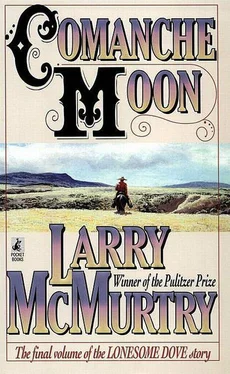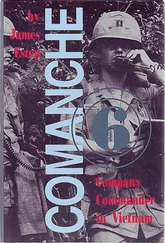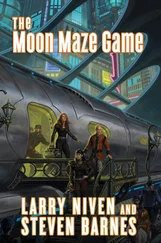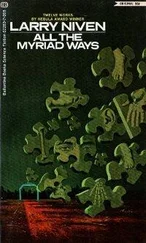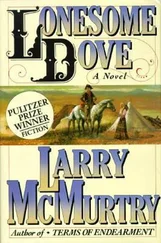Some of the young army men, newcomers, like their Major, to the country of sand and wind, thought something had gone wrong with nature. One private, a thin boy from Illinois, almost frozen from a day in the biting wind, thought the bluish sun meant that the world was coming to an end. He had a memory of a church in Paducah, Illinois, where he had lived as a boy, saying that the world would end with the setting of a blue sun.
The boy's name was Briarley Crisp; he was the youngest man in the troop. His mother and all his sisters wept when he left home; they all expected Briarley to be killed. Briarley had been eager, at the time, to get gone into the army, mainly to escape the plowing, which he detested. Now, looking at the ominous blue sun, its edges tinged with the orange hues of hellfire, andwiththe sand piling up on his eyelids so heavy he could hardly focus his eyes, Briarley knew he had made a terrible, fatal mistake. He had come all the way to Texas to be a soldier, and now the world was ending.
He began to shiver so violently that his shaking caught the eye of Lieutenant Dikuss, who, though nervous himself, felt it was now his responsibility to see that morale did not falter within the troop.
"Stop that shaking, Private Crisp," he said. "If you're chilly get a soogan off the pack mule and wrap up in it." "I ain't shivering from the chill, Lieutenant," Briarley Crisp said. "I see that old blue sun there--a preacher told me once the world would end the night the sun set blue, like that one's setting." "I doubt that that preacher who upset you had spent much time along the Pecos River," Augustus said. "I've seen the sun set blue many a time in these sand showers, but the world hasn't ended. What I do doubt is that we'll see any more of Major Featherstonhaugh this evening--hm or his compass either." They didn't. To Briarley Crisp's relief the sun finally did set; the night that followed saw the temperatures drop so far that the men slept beneath white clouds of frozen breath.
Toward midnight the sandstorm finally blew out--"four the stars were visible again. Augustus debated with himself whether to take advantage of the faint starlight to conduct a quick search for Major Featherstonhaugh; but, in the end, he didn't. The morning promised to be clear--they could easily find the Major then, assuming he had survived the chilly night.
They were not long in doubt on that issue. There was still so much sand in the air that the sun rose in haze, with a fine nimbus around it. To Private Crisp's joy, the world was still there and still dry.
Augustus had just picked up his coffee cup when he saw a moving dot to the south, a dot that soon became Major Featherstonhaugh, cantering briskly toward them on his heavy white mare.
Augustus had advised against the mare, not because of her heft but because she was white. The Comanches they were supposed to be scouting particularly loved a white horse.
"If Kicking Wolf gets sight of her that's one more horse the army won't have to feed, Major," Augustus had informed him, but the Major had only returned a chilly stare.
Now, though, he was simply relieved that Major was alive--it would have been a task to locate him, if he had lost himself on the llano.
"Good morning, Major--I hope you found that compass," Augustus said when Featherstonhaugh trotted up, his uniform caked with dust.
"Of course I found it--t was why I went back," Major Featherstonhaugh said. Dusty as he was he still seemed startled by the suggestion that he might not have found the compass.
"It was made in Reading, England," he added.
"My father took it around the Cape." "I wish I had a bath to offer you, Major," Augustus said. "You look like you've been buried and dug up." "Oh, it was weathery," the Major admitted.
"I thought I might find one of those springs and have a wash, but I couldn't find one--of course I had to wait for daylight before I could locate my compass." The Major dismounted and took a little coffee, carefully inspecting his compass while he breakfasted.
"I wish it would snow," he remarked, to Lieutenant Dikuss. "I'm accustomed to snow when it's this weathery." Lieutenant Dikuss regarded it as a miracle that the Major had reappeared at all; the absence of snow, of which there was an abundance in Wisconsin, did not disturb him.
"You can melt snow, and once it's melted you can heat the water and have a wash," the Major said.
"Does it ever snow here, Captain?" "It snows, but not too many people care to wash in it, Major," Augustus said. "I doubt that washing's as popular in this country as it is in Vermont." An hour later, pressing on north with the aid of Major Featherstonhaugh's compass, Augustus spotted a rider coming toward them across the long sage flats.
"That's Charlie Goodnight--I expect he's got news," Augustus said.
Major Featherstonhaugh and Lieutenant Dikuss both looked in the direction Augustus was pointing but they could see nothing, just high clouds and wavery horizon. The Major could think of very little besides how much he desired to wash. He was sixty-one years old and never, in his more than three decades of soldiering, had he felt as thoroughly soiled as he felt at the moment.
During the weathery night the blowing sand had worked its way into his skin to a depth no dust had ever been allowed to penetrate before. Besides that, his canteen was empty; he could not even wet his kerchief and wipe the dust off his face; his lips were so cracked from the dryness that he would have been hard put to eat even if they had more palatable food; all day the men talked of game, but they saw no game. The Major had once been offered a favorable position in a dry goods firm in Baltimore, but had turned it down out of a distaste for the frivolity of town life. As he stared at the Texas plain, dirt under his collar, incapable of seeing the rider that Captain McCrae could not only see but identify, the Major could not help wondering if he had been wise to turn down that position in the dry goods firm. After all, he could have resided outside of Baltimore and ridden in a buggy--if nothing else there would have been plenty of fine, meltable snow.
"How can you tell who it is?" Lieutenant Dikuss asked. He had finally been able to detect motion in the sage flats to the north, but he could not even tell that the motion was made by a human on a horse. Yet Augustus McCrae could see the horse and even identify the rider.
"Why, I know Charlie," Augustus said.
"I know how he rides. He comes along kind of determined. He don't look fast, but the next thing you know he's there." Events soon bore out Augustus's point-- the next thing the troop knew, Goodnight was there.
"I expected you to be farther along, Captain," Goodnight said. "I suppose the military had a hard time keeping up." Goodnight nodded at Major Featherstonhaugh and promptly turned his horse, as if assuming that the company would immediately respond and follow him. His impatience with military behaviour was well known.
"Nope, this is a speedy troop, Charlie," Augustus said. "The fact is the Major dropped his compass in that sandstorm yesterday and had to go back for it. It's a prominent compass, made in Reading, England." Major Featherstonhaugh, though startled by the man's manner, did not intend to let himself be deflected from his original purpose by mere frontier rudeness; he was dusty as an old boot and felt that his efficiency as a commander would soon diminish if he could not secure a good wash.
"Any springs ahead of us, sir?" he asked Goodnight. "The sand has been plentiful the last two days--I think we could all profit from a good bath.
"I imagine our weapons need cleaning as well," he added--it had just occurred to him that the blowing dust might have gummed up mechanisms to their pistols and rifles and revolvers.
Military ignorance did not surprise Goodnight.
Читать дальше
